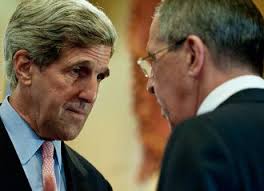 Russia and the United States announced on Tuesday they would seek to convene an international conference aimed at ending the civil war in Syria, jointly intensifying their diplomatic pressure on the combatants to peacefully settle a conflict that has taken more than 70,000 lives and left millions displaced and desperate.
Russia and the United States announced on Tuesday they would seek to convene an international conference aimed at ending the civil war in Syria, jointly intensifying their diplomatic pressure on the combatants to peacefully settle a conflict that has taken more than 70,000 lives and left millions displaced and desperate.
Secretary of State John Kerry and his Russian counterpart, Foreign Minister Sergey V. Lavrov, announced their agreement to arrange the conference, possibly before the end of the month. Mr. Kerry, who was visiting Russia seeking to find common ground on the Syria conflict, told reporters at a joint appearance with Mr. Lavrov in Moscow that the aim would be to push the government of President Bashar al-Assad and the Syrian opposition to attend.
Mr. Kerry said both Russia and the United States want to hold the conference “as soon as practical, possibly, hopefully as soon as the end of this month.”
Russia is Mr. Assad’s most important foreign patron, and the United States supports the insurgency that has been seeking to depose him.
The announcement appeared to signal a strong desire by both countries to halt what has been a dangerous escalation in the conflict, with evidence of chemical weapons use, a surge in the number of civilians fleeing combat and overwhelming Syria’s neighbors. Israeli aerial attacks this past weekend on suspected munitions sites in Syria heightened the tensions in the region.
It was unclear how Mr. Kerry and Mr. Lavrov would persuade the antagonists in the two-year-old Syrian conflict to put aside their hostilities for talks.But word of the Russian-American diplomatic effort was nonetheless an optimistic spot on what was otherwise a bleak day in the conflict.
Earlier Tuesday, four United Nations soldiers patrolling part of the disputed Golan Heights area between Syria and Israel were detained by Syrian insurgents, the second time in two months that members of the blue-helmeted international peacekeeping force in that region have become entangled in Syria’s civil war.
Secretary General Ban Ki-moon condemned the detentions and called for the immediate release of the peacekeepers. A spokesman for Mr. Ban, Martin Nesirky, told reporters at the United Nations that all parties must respect the peacekeeping force’s “freedom of movement and safety and security.”
In Geneva, United Nations relief agency officials said the number of displaced Syrians inside the country had more than doubled in the past two months, to 4.25 million, and that roughly one in three Syrians, or about 6.8 million, needed urgent assistance — half of them children.
A Syrian insurgent group that calls itself the Martyrs of Yarmouk, responsible for the last abduction of United Nations peacekeepers in the Golan region, asserted that it had taken custody of the four soldiers for their own safety and posted a photograph of the detainees on Facebook. All are Filipinos and did not appear to be harmed.
Josephine Guerrero, a spokeswoman for the United Nations departments that oversee its global peacekeeping operations, said efforts to secure the release of the peacekeepers were under way. Ms. Guerrero said she could not confirm the identities of their abductors but said they were seized near the hamlet of Al Jamlah, where the previous group had been held.
The Martyrs of Yarmouk detained 21 Filipino members of the Golan peacekeeping force on March 6. That group was freed after four days, following negotiations and international calls for their release.
After that abduction, force commanders deployed more armored cars and decreased the number of patrols.
The Filipino soldiers are a component of the United Nations Disengagement Observer Force, the peacekeeping unit responsible for patrolling the Golan Heights buffer zone region between Israel and Syria, established in 1974 after a war in which Israel seized part of the strategic area from Syria. Both countries remain in a technical state of war.
The latest abduction episode came against a backdrop of sharply heightened tensions between Syria and Israel in recent days. The government of President Bashar al-Assad of Syria has accused the Israelis of aerial assaults on military targets near the Syrian capital, Damascus. Israel has not publicly claimed responsibility for those assaults, but Israeli officials have said they will hit targets in Syria that they believe contain armaments destined for Hezbollah, the Lebanese Shiite militant group that is Mr. Assad’s ally.
The Israelis have strengthened their military deployment in the Golan Heights area recently, reflecting growing concern by Israel that the two-year-old civil war in Syria could spill over the disputed border. The Israelis have reported at least 30 instances of errant munitions from Syria landing in the Golan, with at least five prompting Israel to fire back.
The fighting has also created a dilemma for the United Nations on how to continue an important mission while keeping its peacekeepers safe in what has become a combat zone.
Aside from the Philippines, the other soldiers in the roughly 900-member force come from Austria, India, Morocco and Moldova. Croatia withdrew its contingent after revelations in February that it had been shipping arms to the Syrian rebels.
NY Times

Leave a Reply
You must be logged in to post a comment.